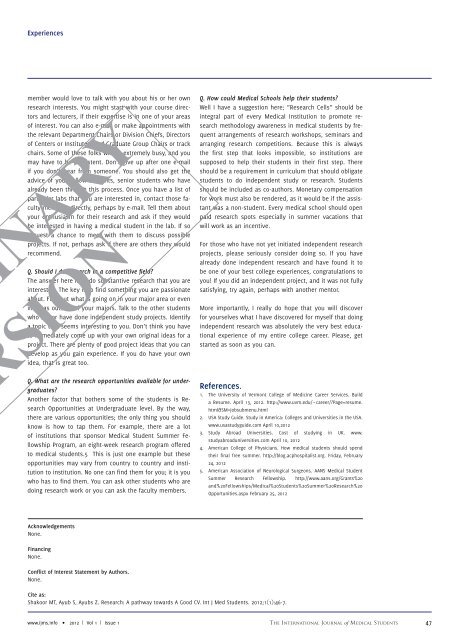Year 2012 - Volume 1 - Issue 1 - IJMS
Year 2012 - Volume 1 - Issue 1 - IJMS
Year 2012 - Volume 1 - Issue 1 - IJMS
You also want an ePaper? Increase the reach of your titles
YUMPU automatically turns print PDFs into web optimized ePapers that Google loves.
Experiences<br />
member would love to talk with you about his or her own<br />
research interests. You might start with your course directors<br />
and lecturers, if their expertise is in one of your areas<br />
of interest. You can also e-mail or make appointments with<br />
the relevant Department Chairs or Division Chiefs, Directors<br />
of Centers or Institutes, and Graduate Group Chairs or track<br />
chairs. Some of these folks will be extremely busy, and you<br />
may have to be persistent. Don’t give up after one e-mail<br />
if you don’t hear from someone. You should also get the<br />
advice of your fellow students, senior students who have<br />
already been through this process. Once you have a list of<br />
particular labs that you are interested in, contact those faculty<br />
members directly, perhaps by e-mail. Tell them about<br />
your enthusiasm for their research and ask if they would<br />
be interested in having a medical student in the lab. If so<br />
request a chance to meet with them to discuss possible<br />
projects. If not, perhaps ask if there are others they would<br />
recommend.<br />
NARY<br />
Q. Should I do research in a competitive field?<br />
The answer here is to do substantive research that you are<br />
interested. The key is to find something you are passionate<br />
about. Find out what is going on in your major area or even<br />
in areas outside of your majors. Talk to the other students<br />
who are or have done independent study projects. Identify<br />
a topic that seems interesting to you. Don’t think you have<br />
to immediately come up with your own original ideas for a<br />
project. There are plenty of good project ideas that you can<br />
develop as you gain experience. If you do have your own<br />
idea, that is great too.<br />
SION<br />
Q. What are the research opportunities available for undergraduates?<br />
Another factor that bothers some of the students is Research<br />
Opportunities at Undergraduate level. By the way,<br />
there are various opportunities; the only thing you should<br />
know is how to tap them. For example, there are a lot<br />
of institutions that sponsor Medical Student Summer Fellowship<br />
Program, an eight-week research program offered<br />
to medical students.5 This is just one example but these<br />
opportunities may vary from country to country and institution<br />
to institution. No one can find them for you; it is you<br />
who has to find them. You can ask other students who are<br />
doing research work or you can ask the faculty members.<br />
Acknowledgements<br />
None.<br />
Financing<br />
None.<br />
Conflict of Interest Statement by Authors.<br />
None.<br />
Q. How could Medical Schools help their students?<br />
Well I have a suggestion here; “Research Cells” should be<br />
integral part of every Medical Institution to promote research<br />
methodology awareness in medical students by frequent<br />
arrangements of research workshops, seminars and<br />
arranging research competitions. Because this is always<br />
the first step that looks impossible, so institutions are<br />
supposed to help their students in their first step. There<br />
should be a requirement in curriculum that should obligate<br />
students to do independent study or research. Students<br />
should be included as co-authors. Monetary compensation<br />
for work must also be rendered, as it would be if the assistant<br />
was a non-student. Every medical school should open<br />
paid research spots especially in summer vacations that<br />
will work as an incentive.<br />
For those who have not yet initiated independent research<br />
projects, please seriously consider doing so. If you have<br />
already done independent research and have found it to<br />
be one of your best college experiences, congratulations to<br />
you! If you did an independent project, and it was not fully<br />
satisfying, try again, perhaps with another mentor.<br />
More importantly, I really do hope that you will discover<br />
for yourselves what I have discovered for myself that doing<br />
independent research was absolutely the very best educational<br />
experience of my entire college career. Please, get<br />
started as soon as you can.<br />
References.<br />
1. The University of Vermont College of Medicine Career Services. Build<br />
a Resume. April 13, <strong>2012</strong>. http://www.uvm.edu/~career/?Page=resume.<br />
html&SM=jobsubmenu.html<br />
2. USA Study Guide. Study in America: Colleges and Universities in the USA.<br />
www.usastudyguide.com April 10,<strong>2012</strong><br />
3. Study Abroad Universities. Cost of studying in UK. www.<br />
studyabroaduniversities.com April 10, <strong>2012</strong><br />
4. American College of Physicians. How medical students should spend<br />
their final free summer. http://blog.acphospitalist.org. Friday, February<br />
24, <strong>2012</strong><br />
5. American Association of Neurological Surgeons. AANS Medical Student<br />
Summer Research Fellowship. http://www.aans.org/Grants%20<br />
and%20Fellowships/Medical%20Students%20Summer%20Research%20<br />
Opportunities.aspx February 25, <strong>2012</strong><br />
Cite as:<br />
Shakoor MT, Ayub S, Ayubs Z. Research: A pathway towards A Good CV. Int J Med Students. <strong>2012</strong>;1(1):46-7.<br />
www.ijms.info • <strong>2012</strong> | Vol 1 | <strong>Issue</strong> 1 The International Journal of Medical Students 47


